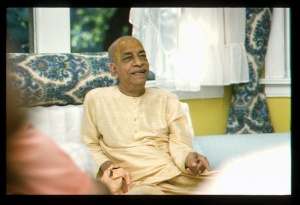SB 4.14.23: Difference between revisions
m (1 revision(s)) |
No edit summary |
||
| Line 1: | Line 1: | ||
{{info | {{info | ||
|speaker=King Vena | |speaker=King Vena | ||
|listener=great sages | |listener=great sages | ||
}} | }} | ||
[[Category:Srimad-Bhagavatam - Canto 04 Chapter 14]] | |||
[[Category:Bhagavatam Verses Spoken by Vena Maharaja - Vanisource|041423]] | |||
<div style="float:left">'''[[Srimad-Bhagavatam]] - [[SB 4|Fourth Canto]] - [[SB 4.14: The Story of King Vena|Chapter 14: The Story of King Vena]]'''</div> | |||
<div style="float:right">[[File:Go-previous.png|link=SB 4.14.22]] '''[[SB 4.14.22]] - [[SB 4.14.24]]''' [[File:Go-next.png|link=SB 4.14.24]]</div> | |||
{{RandomImage}} | |||
==== TEXT 23 ==== | ==== TEXT 23 ==== | ||
<div | <div class="verse"> | ||
vena uvāca | :vena uvāca | ||
bāliśā bata yūyaṁ vā | :bāliśā bata yūyaṁ vā | ||
adharme dharma-māninaḥ | :adharme dharma-māninaḥ | ||
ye vṛttidaṁ patiṁ hitvā | :ye vṛttidaṁ patiṁ hitvā | ||
jāraṁ patim upāsate | :jāraṁ patim upāsate | ||
</div> | </div> | ||
| Line 17: | Line 23: | ||
==== SYNONYMS ==== | ==== SYNONYMS ==== | ||
<div | <div class="synonyms"> | ||
''venaḥ''—King Vena; ''uvāca''—replied; ''bāliśāḥ''—childish; ''bata''—oh; ''yūyam''—all of you; ''vā''—indeed; ''adharme''—in irreligious principles; ''dharma-māninaḥ''—accepting as religious; ''ye''—all of you who; ''vṛttidam''—providing maintenance; ''patim''—husband; ''hitvā''—giving up; ''jāram''—paramour; ''patim''—husband; ''upāsate''—worship. | |||
</div> | </div> | ||
| Line 24: | Line 30: | ||
==== TRANSLATION ==== | ==== TRANSLATION ==== | ||
<div | <div class="translation"> | ||
King Vena replied: You are not at all experienced. It is very much regrettable that you are maintaining something which is not religious and are accepting it as religious. Indeed, I think you are giving up your real husband, who maintains you, and are searching after some paramour to worship. | King Vena replied: You are not at all experienced. It is very much regrettable that you are maintaining something which is not religious and are accepting it as religious. Indeed, I think you are giving up your real husband, who maintains you, and are searching after some paramour to worship. | ||
</div> | </div> | ||
| Line 31: | Line 37: | ||
==== PURPORT ==== | ==== PURPORT ==== | ||
<div | <div class="purport"> | ||
King Vena was so foolish that he accused the saintly sages of being inexperienced like small children. In other words, he was accusing them of not having perfect knowledge. In this way he could reject their advice and make accusations against them, comparing them to a woman who does not care for her husband who maintains her but goes to satisfy a paramour who does not maintain her. The purpose of this simile is apparent. It is the duty of the kṣatriyas to engage the brāhmaṇas in different types of religious activities, and the king is supposed to be the maintainer of the brāhmaṇas. If the brāhmaṇas do not worship the king but instead go to the demigods, they are as polluted as unchaste women. | King Vena was so foolish that he accused the saintly sages of being inexperienced like small children. In other words, he was accusing them of not having perfect knowledge. In this way he could reject their advice and make accusations against them, comparing them to a woman who does not care for her husband who maintains her but goes to satisfy a paramour who does not maintain her. The purpose of this simile is apparent. It is the duty of the ''kṣatriyas'' to engage the ''brāhmaṇas'' in different types of religious activities, and the king is supposed to be the maintainer of the ''brāhmaṇas''. If the ''brāhmaṇas'' do not worship the king but instead go to the demigods, they are as polluted as unchaste women. | ||
</div> | </div> | ||
__NOTOC__ | |||
<div style="float:right; clear:both;">[[File:Go-previous.png|link=SB 4.14.22]] '''[[SB 4.14.22]] - [[SB 4.14.24]]''' [[File:Go-next.png|link=SB 4.14.24]]</div> | |||
__NOTOC__ | |||
__NOEDITSECTION__ | |||
Revision as of 11:41, 18 May 2021

A.C. Bhaktivedanta Swami Prabhupada
TEXT 23
- vena uvāca
- bāliśā bata yūyaṁ vā
- adharme dharma-māninaḥ
- ye vṛttidaṁ patiṁ hitvā
- jāraṁ patim upāsate
SYNONYMS
venaḥ—King Vena; uvāca—replied; bāliśāḥ—childish; bata—oh; yūyam—all of you; vā—indeed; adharme—in irreligious principles; dharma-māninaḥ—accepting as religious; ye—all of you who; vṛttidam—providing maintenance; patim—husband; hitvā—giving up; jāram—paramour; patim—husband; upāsate—worship.
TRANSLATION
King Vena replied: You are not at all experienced. It is very much regrettable that you are maintaining something which is not religious and are accepting it as religious. Indeed, I think you are giving up your real husband, who maintains you, and are searching after some paramour to worship.
PURPORT
King Vena was so foolish that he accused the saintly sages of being inexperienced like small children. In other words, he was accusing them of not having perfect knowledge. In this way he could reject their advice and make accusations against them, comparing them to a woman who does not care for her husband who maintains her but goes to satisfy a paramour who does not maintain her. The purpose of this simile is apparent. It is the duty of the kṣatriyas to engage the brāhmaṇas in different types of religious activities, and the king is supposed to be the maintainer of the brāhmaṇas. If the brāhmaṇas do not worship the king but instead go to the demigods, they are as polluted as unchaste women.